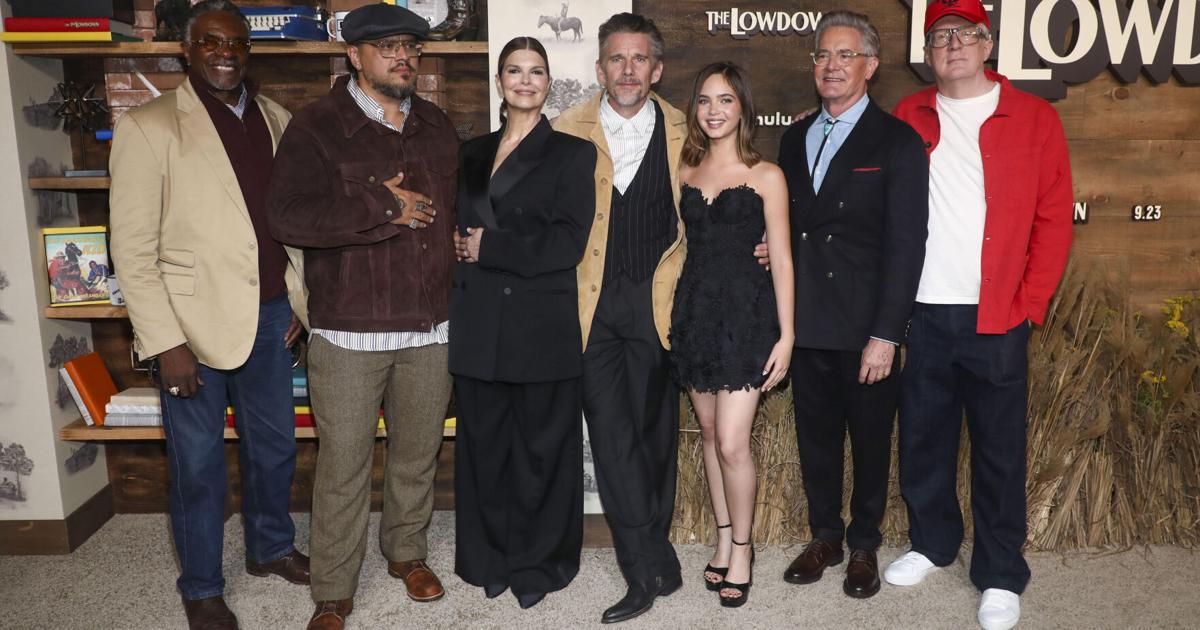
Jimmie Tramel
Tulsa World Scene Reporter
Get email notifications on {{subject}} daily!
Your notification has been saved.
There was a problem saving your notification.
{{description}}
Email notifications are only sent once a day, and only if there are new matching items.
Followed notifications
Please log in to use this feature
Log In
Don’t have an account? Sign Up Today
You only have to wait a few more days to see the debut of the new shot-in-Tulsa series “The Lowdown.”
For an appetizer, you can read what cast members and the series’ creator, Sterlin Harjo, are saying about the show, which will premiere with two episodes Tuesday, Sept. 23 on FX.
In advance of the debut, FX arranged a group press conference Wednesday with Harjo and four of the show’s actors — Ethan Hawke, Keith David, Jeanne Tripplehorn and Kyle MacLachlan.
Hawke stars as a citizen journalist and self-proclaimed “truthstorian” in “The Lowdown.” The character’s newest investigative piece is an exposé of the powerful Washberg family. MacLachlan plays Donald Washberg, who aims to be Oklahoma’s governor, and Tripplehorn plays Betty Jo Washberg, his widowed sister-in-law. David’s character, Marty, pops up amid the friction. Who the heck is this guy and what are his motives?
“The Lowdown” will premiere Sept. 23 on FX with the first two episodes of an eight-episode inaugural season. The series follows the “gritty” exploits of citizen journalist Lee Raybon, a self-proclaimed Tulsa “truthstorian” played by Ethan Hawke whose obsession with the truth is always getting him into trouble.
Questions were submitted in advance of the group press conference, which was accessed by journalists via Zoom. Selected questions were pitched to Harjo and the actors by a moderator.
Excerpts from the press conference follow, beginning with Harjo explaining why Tulsa was a ripe setting for a noir project. The Tulsa-based filmmaker said noir has been explored in Los Angeles, New York City and even New Orleans.
“But there’s so much sort of political and cultural activity, I think, happening in the middle of the country,” Harjo said. “And Tulsa felt like the right place. It has the right amount of grit, the right amount of history, the right amount of secrets to set the story in. For a show that’s about someone fighting for truth, there’s a longstanding need for the truth in a place like Oklahoma, so that’s where we find our hero.”
Teaming up in Tulsa
The actors were asked about their favorite aspects of filming in Tulsa.
MacLachlan mentioned breakfast and coffee at a Cherry Street bakery, adding that he loved the people of Tulsa and loved the crew.
“When I did the pilot, I had a wonderful guide,” he said. “Her name is Jeanne Tripplehorn. You’ve heard of her, and she took me around and showed me some sides to Tulsa that I never knew existed but I needed to see.”
Tripplehorn talked about how her favorite part of filming in Tulsa was the opportunity to return to her hometown. Harjo interjected with this: “She’s also being humble. She is Tulsa royalty. Everyone was so excited for Jeanne to come back home and film the show.”
David answered by saying he had the “great privilege of working with all these wonderful folks here who I have longstanding admiration for.” He also said he got to meet one of the consultants (Chief Egunwale Amusan) and explore Tulsa with him. “It just doesn’t get better than that, so I had a wonderful time.”
Hawke, who previously filmed in Tulsa when he guest-starred in the next-to-last episode of Harjo’s “Reservation Dogs,” said he has known Harjo for a few years but hadn’t really known his community. Hawke shared that he discovered a strong sense of community in Tulsa.
“People are really rooting for each other,” he said. “They’re pulling for each other. A lot of people are making art for art’s sake, whereas when you get to New York or LA, everybody’s making something to get somewhere else, and there feels like the creativity that you’re running into is extremely authentic (in Tulsa). The past is very present. You’re aware of the architecture and the streets and the way people talk — that it has a very, very deep past that is representative of America as a whole.”
Continuing, Hawke said: “It was an amazing place to get to meet a huge community of committed people. They’re all on a like-minded vision. We all were serving the same goal. My kids went to school down there. It was a long shoot, and we were so welcomed that it was one of the best experiences of my life.”
Working the connection
Asked if Hawke’s guest appearance on “Reservation Dogs” led to him being the lead in “The Lowdown,” Harjo recapped the origin story of a friendship that began prior to Rez Dogs.
Harjo said Hawke reached out to him after the first season of “Reservation Dogs” to say how much he liked the show. Hawke also mentioned he would be interested in being in Rez Dogs.
“And then I was like, well, let me go write you a part,” Harjo said.
That’s how Hawke became the father of Elora Danan, a “Reservation Dogs” character played by Devery Jacobs.
“And we just had such a good time,” Harjo said. “And it was obvious that Ethan had a good time. Tulsa is a great community. There’s so many great artists and musicians, and everyone came on set. Everyone was playing music and hanging out and being friends.”
Harjo concluded he should work more with Hawke. “The Lowdown” was a project Harjo had been thinking about for a while. He viewed it as the ideal opportunity to work “in a bigger capacity” with Hawke.
“I actually sent him the script under the guise of ‘I just wanted notes as a writer’ and not knowing if he’d want to do the part or not,” Harjo said.
“I just thought I’m going to give this to him and let him read this thing and see what he says. Lucky for me, he came back, and he was like, ‘Well, why aren’t you offering me this part?’ So I quickly was like, ‘I’m going to offer you this part.’ And that was really it.”
The need for truth in history
Listen now and subscribe: Apple Podcasts | Google Podcasts | Spotify | RSS Feed | SoundStack
Hawke was asked about being a “truthstorian” who keeps digging even though it may cost him personally. Hawke has to balance his character’s obsessive side with vulnerability, especially when it comes to his daughter.
Hawke said he loves the expression “truthstorian” because, first of all, it’s not really a word. But it expresses a “true thing” for his character, Lee Raybon, which is the intersection of truth in history is needed.
“Without understanding where we come from, we don’t understand where we are,” Hawke said.
The mashup of “truth” and “historian” into one word is also sloppy and kind of a train wreck of an expression — and hard to say, according to Hawke, who nonetheless said it seemed perfect for his character.
“I’m always drawn to people who really do want to follow their dreams,” he said, adding that “follow your dreams” is easy to say to kids, but it’s harder to pursue dreams as an adult because you have grown-up responsibilities.
“A lot of people compromise those things, and Lee doesn’t,” Hawke said. “But there’s a price to be paid, and that largely shows up in his relationship with his family life and with his daughter. As somebody who has been chasing his dreams his whole life, in my relationship with my oldest daughter, particularly, it’s a fine balance to be the parent you want to be and the human being you want to be, and sometimes they don’t seem to line up.
“And I think the writing of the show was wonderful, because it’s such a big canvas. You get to see all of us in multiple dimensions. And that’s the wonderful thing about about television, is you get this big, epic canvas.”
Comparing Harjo to David Lynch
MacLachlan often collaborated with visionary filmmaker David Lynch, who died earlier this year. MacLachlan was asked if he sees any similarities between Lynch and Harjo.
“I do,” MacLachlan said. “There are many reasons that I enjoyed working with David. His worlds are singular and specific, and I felt like the world of ‘The Lowdown’ is singular and specific. There was an atmosphere of joy, fun and creativity working with David Lynch that I also felt working with Sterlin. There was also a feeling that the material, the script, is the starting point, and that there was always room for growth and improvement. And often, working with David, the script would change, situations would change, lines would change, things would be transposed. And working with Sterlin was the same way. There was always change and shifting going on and development and improvements and just just making the scene better. So that was similar. There are many more similarities than differences between with the two of them. And I know Sterlin is a great admirer of David’s. To experience Sterlin’s set and say to myself — before the question (was asked today) — ‘Well, I feel like I’m kind of back in the land of Lynch here’ was really something that made me happy.”
Responded Harjo: “I can retire now.”
‘A very noble endeavor’
Hawke’s character is based on late Tulsa journalist Lee Roy Chapman. The character is named Lee Raybon. Hawke was asked what he has learned about Raybon’s fight for the truth.
Hawke said he doesn’t want to speak for everybody.
“But as an actor I feel grateful for this job, for the world and the role that Sterlin created. … It is on the page. That is what we do. We perform this writing and I’m so grateful to be a part of a story that centers on truth and journalistic integrity.”
Continuing, Hawke said every interview he did got fact-checked when he was a kid and he was starting out in the business. He added that he hasn’t been fact-checked in years.
“And what the role of journalism is, and the ways that we tell stories and the way we tell our community’s stories and the way that we talk about ourselves and create a narrative of our lives and of our community — it just couldn’t be more important,” he said.
“I know the idea of this story is old for you, but it’s falling at a time where I feel really grateful to be doing a press conference and really grateful to be sharing ‘The Lowdown’ with people, because the show is full of love, it’s full of wit and humor and silliness, and it’s got an undercurrent of a really honest conversation about who we are and how we can intersect with each other and hold multiple truths at the same time.”
Harjo said “The Lowdown” is about searching for the truth when it feels like it’s not reachable.
“Balancing your life and moving forward and still trying to grasp the truth, that is a very noble endeavor today,” he said, adding that we need people like Lee and we need journalists “and we need people on the front lines of morality and finding what the truth is, and we need people not to give up in that search for truth.”
‘This person has voice’
Hawke, reminded that he has worked with great filmmakers, was asked what sets Harjo apart from some other filmmakers. Hawke said Harjo is unlike anyone he has ever met, yet Harjo shares certain things in common with other filmmakers. For instance? He has “voice.”
Explaining, Hawke said you knew immediately when you saw the film “She’s Gotta Have It” that Spike Lee had voice. Lynch had voice. Hawke said he was watching Jim Jarmusch’s “Dead Man” the other day, and it’s a film with voice.
“And when I started watching Sterlin’s work, it was like, this person has voice. There’s something identifiable that you can’t exactly name, which is a unique way of storytelling that comes from your unique upbringing. We all have it. But that’s translated through you into the way that you handle the set, the way that you write, the way that you think about the camera, the ways that we rehearse.”
Hawke said it’s fun to work with somebody who cares passionately and is not overwhelmed with stress.
“As performers, relaxation is absolutely everything,” he said. “And a lot of directors, their passion and care manifests as anxiety. The set is a very anxious place to be. Everybody’s worried about time, everybody’s worried about money, everybody’s worried about the shot. And Sterlin’s approach is very opposite to that.”
Hawke said one of the reasons Harjo likes his crew so much is everyone knows one another, and there’s a “safety net” because of that.
“Everybody has been through struggles before and survived them, and you feel that when you walk on set,” he said.
“It’s going to be OK. We’re going to figure this out. This scene’s not working? All right. We’re going to figure it out. And that gives me a lot of confidence because then I can say, ‘Well, if you’re open minded, I think it would be really funny — let’s not sit here; let’s go sit over here, and let’s do that.’ And then, and if Sterlin thinks it’s funny, we’ll do it. If you don’t think it’s funny, we won’t do it. Or if it’s not ‘real,’ or whatever the word is you want to use. But it really was a unique set. I sensed it on ‘Reservation Dogs.’ That was only a week, but I sensed it was a place where we might be able to do something original.”
jimmie.tramel@tulsaworld.com
Stay up-to-date on what’s happening
Receive the latest in local entertainment news in your inbox weekly!
* I understand and agree that registration on or use of this site constitutes agreement to its user agreement and privacy policy.
Jimmie Tramel
Tulsa World Scene Reporter
Get email notifications on {{subject}} daily!
Your notification has been saved.
There was a problem saving your notification.
{{description}}
Email notifications are only sent once a day, and only if there are new matching items.
Followed notifications
Please log in to use this feature
Log In
Don’t have an account? Sign Up Today



